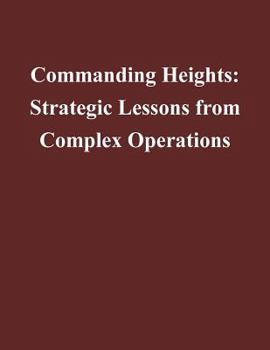Commanding Heights: Strategic Lessons from Complex Operations
The natural tendency of people to view problems from the perspective of their home organization is widely acknowledged in Washington. The corrosive effect this has on unity of intent and unity of effort is also acknowledged, documented, and lamented. As long as the stakes are small, the costs of such parochialism are apparently endurable. Our recent frustrations in Iraq and Afghanistan, however, have elevated the problem of so-called "stove-piping" to a high profile. The proposed remedy to stove-piping is the "whole of government" approach to complex problems. Also known as the "comprehensive approach," the putative advantage of whole of government approaches is that they lift the level of analysis to a higher altitude, providing a better view of the full extent and complexity of the problem in question. The inevitable decrease in resolution, or granularity, should be more than balanced by an improved strategic perspective. Regrettably, however, the discipline of the whole of government approach has not been consistently applied, as bureaucratic inertia pushes back against proposed new practices.Despite countless testimonials of commitment to whole of government collaboration, true collaboration remains ad hoc and dependent on specific circumstances, rather than institutionally hard-wired into the practices and behaviors of departments and agencies. Although efforts are being undertaken to improve collaboration, interagency secondments remain de-incentivized and bureaucratically cumbersome, thus discouraging the growth of a cadre of whole of government professionals. Interagency collaboration also remains stunted by incompatible communications systems, operational practices, and organizational cultures.
Format:Paperback
Language:English
ISBN:1502489325
ISBN13:9781502489326
Release Date:September 2014
Publisher:Createspace Independent Publishing Platform
Length:182 Pages
Weight:0.96 lbs.
Dimensions:0.4" x 8.5" x 11.0"
Customer Reviews
0 rating





